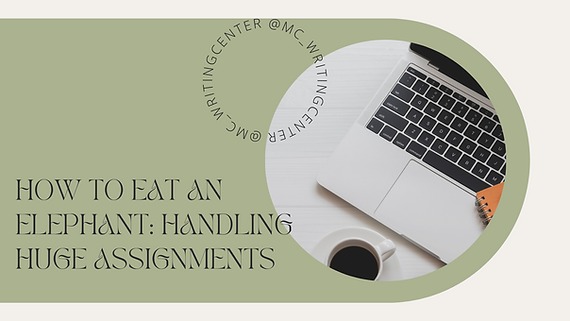How To Eat An Elephant: Handling Huge Assignments
by Avery Wolfe

Howdy! I’m Avery Wolfe, a tutor in the Writing Center. It's that time of the semester: all of our professors are suddenly mentioning the dates we haven't heard since syllabus week, and now it's time to finalize that project we've had all semester to work on. Never fear! This is How To Eat an Elephant.
Start With the Toes
Sometimes I look at an assignment sheet and immediately become overwhelmed by the expectations laid out by the professor. The sheer volume of work can be overwhelming, or the content alone can require a lot of mental gymnastics, which is equally daunting.
Regardless, if an assignment is physically long or mentally challenging, the way to make it more digestible is to start from the grass up—the toes. Write down what immediately comes to your mind when you read your assignment, and expand on those ideas from the knowledge already sitting in your head. If one idea isn’t sparking a lot of content, eliminate it and move on. This will help declutter your brain while leaving room for more formed ideas to develop a foundation for your assignment.
If you are having trouble, make an appointment with a Writing Center tutor to help you decide what topic you want to dive into. Our tutors will help you create a plan, even if all you have is an assignment sheet! During this stage, aim to come up with a thesis—this will ensure your assignment is focused and addresses your prompt.
Next, the Legs
Once you’ve developed a foundation—a glimmer of what your assignment will be—start drawing connections. Take your initial idea, and put in the work of research. If it’s not a research based assignment, sit with the idea, let it roll around in your brain, and see what other thoughts emerge. This process takes time (elephants have quite long legs), but you will have a strong direction when you start writing your paper. Invest the time here, learn everything that you can, and write it down. Even if it is messy and unorganized, strive to get the information on paper and out of your brain.
The more time you spend during this stage, the more organized your argument will be, and your paper will have credible evidence that you can clean up into a semi-polished body.
Take Your Time with the Body
When you get to writing, don’t expect to produce your final draft. Try starting your essay by handwriting it. Tangibly put your words on paper, even if your handwriting is as messy as the sentences you form with it; and don’t stop! At this stage, aim for content, even if it is not quite as polished as you would like. If you prefer typing, type random thoughts, even if they end up out of order or all over the place. Make it easy on yourself – you can always clean up later.
Next, comb through the haphazard, messy, disjointed collection of sentences or paragraphs to find gems to further polish and develop for an actual essay. Now is the time to refine or expand. It doesn’t have to be perfect, but try a little harder. Weave in some evidence, or make a note of where you’ll put evidence. Again, make it easy, work with what you have, and build slowly. For this stage, you should aim to generate a draft that is close to your page or word requirement.
Finally, the Ears
Once you have this part, I would suggest having someone peer review your piece. Then, with a calmer mind and suggestions, you can start finalizing it. Stylize the sentences, work on grammar, reorganize, restructure, layer in your evidence, and then let someone look at it again.
For this final stage, make sure your formatting is correct, your evidence is clear, and your writing is concise. If you are worried about grammar, you can ask a friend to edit it (or submit it to the Writing Center!), or read it aloud to catch any mistakes. The earlier you start, the more time you will have for this last-minute review.
Writing isn’t a quick process, but it doesn’t necessarily have to be a hard or overwhelming one. Break it up, consume it slowly, and, bite by bite, you can eat the elephant.
Bon appetit,
Avery


